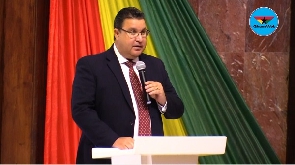The Country Director for World Bank, Frank Laporte, has warned Ghana over its borrowing rate.
Amidst concerns of Ghana being classified as high debt distress country, Laporte said he is confident the Finance Ministry is aware of the effects of the borrowings.
Speaking to the media after a courtesy call on the Speaker of Parliament, Pierre Frank Laporte said though every country will have to borrow it must be cautious of the quantum of borrowing.
“Countries especially developing countries have to borrow because most of us do not have adequate resources, we have to borrow to develop, but we have to borrow responsibly. At the moment, Ghana’s debt situation according to World Bank description is a country at a moderate rate to high risk of debt distress; of course, yes, the country has to be careful,” said Mr Laporte.
He added that “I’m confident the Finance Minister and his team are fully aware of that, we discussed all the time and borrowing as I said is not always a bad thing but you must borrow at the right terms, as best as most favourable as possible and the right amount and the right way.”
Ken Ofori-Atta explains how borrowing can transform Ghana’s economy
Finance Minister Ken Ofori-Atta has reiterated the need for Ghana to make room for smart borrowings as the country bids to become an export driven economy.
He explained that the country does not have an over-flowing revenue reserves to push its ambitious economic transformation agenda, hence the need to borrow.
Speaking on Joynews’ Newfile, the Finance Minister said “I think we’re at 60 percent if you include our energy and financial services intervention you axe that and you’re around 58, 59%. The challenge really when you look at the Asian countries, etc is not that you shouldn’t borrow.
“How do you then move to an export-driven economy such that our net international reserves coverage is not four months but its two years or it's three years so that the vexing issue of currency depreciation does not occur?” he said.
Click to view details



Business News of Monday, 10 February 2020
Source: www.ghanaweb.com

















